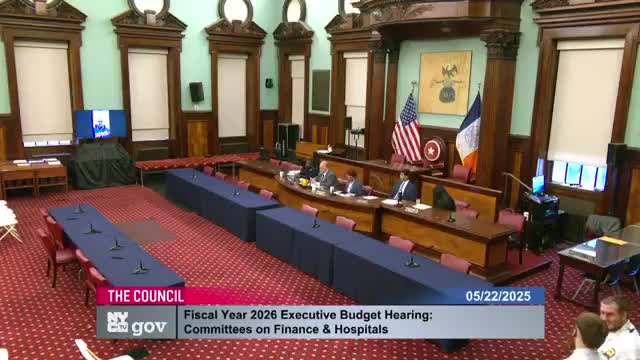City Council urged to fund Latino organizations for crisis management system
May 26, 2025 | New York City Council, New York City, New York County, New York
This article was created by AI summarizing key points discussed. AI makes mistakes, so for full details and context, please refer to the video of the full meeting. Please report any errors so we can fix them. Report an error »

In the heart of New York City, a recent government meeting brought to light pressing issues surrounding healthcare access and the challenges faced by social workers in hospitals. As city officials gathered to discuss the Fiscal Year 2026 Executive Budget, voices from the community echoed the urgent need for change, particularly for marginalized populations.
One passionate speaker highlighted the significant language and racial barriers that many patients encounter when seeking hospital care. This individual called for increased funding for nonprofit organizations that serve predominantly Hispanic and African American communities, emphasizing that these groups are essential in bridging the gap between patients and healthcare providers. They urged the city council to allocate a portion of the crisis management funding—up to $100 million—to support these nonprofits, which play a crucial role in crisis intervention and community trust.
Following this, Nathan Franco, a dedicated social worker at Harlem Hospital, shared insights from his 15 years of experience. He underscored the vital role social workers play in patient care, especially during transitions from hospital to home. Franco revealed alarming survey results indicating that two-thirds of social workers at Health and Hospitals (H and H) feel their caseloads are unmanageable, leading to a decline in the quality of care. He advocated for enforced caseload limits, similar to those established for registered nurses, to enhance both patient outcomes and worker retention.
The discussions at this budget hearing reflect a broader concern for equitable healthcare access in New York City. As community leaders and healthcare professionals push for necessary reforms, the call for adequate funding and support for social services becomes increasingly urgent. The meeting not only highlighted the challenges faced by vulnerable populations but also the dedication of those working tirelessly to improve the healthcare system. As the city moves forward, the implications of these discussions will resonate throughout the community, shaping the future of healthcare in New York.
One passionate speaker highlighted the significant language and racial barriers that many patients encounter when seeking hospital care. This individual called for increased funding for nonprofit organizations that serve predominantly Hispanic and African American communities, emphasizing that these groups are essential in bridging the gap between patients and healthcare providers. They urged the city council to allocate a portion of the crisis management funding—up to $100 million—to support these nonprofits, which play a crucial role in crisis intervention and community trust.
Following this, Nathan Franco, a dedicated social worker at Harlem Hospital, shared insights from his 15 years of experience. He underscored the vital role social workers play in patient care, especially during transitions from hospital to home. Franco revealed alarming survey results indicating that two-thirds of social workers at Health and Hospitals (H and H) feel their caseloads are unmanageable, leading to a decline in the quality of care. He advocated for enforced caseload limits, similar to those established for registered nurses, to enhance both patient outcomes and worker retention.
The discussions at this budget hearing reflect a broader concern for equitable healthcare access in New York City. As community leaders and healthcare professionals push for necessary reforms, the call for adequate funding and support for social services becomes increasingly urgent. The meeting not only highlighted the challenges faced by vulnerable populations but also the dedication of those working tirelessly to improve the healthcare system. As the city moves forward, the implications of these discussions will resonate throughout the community, shaping the future of healthcare in New York.
View full meeting
This article is based on a recent meeting—watch the full video and explore the complete transcript for deeper insights into the discussion.
View full meeting
